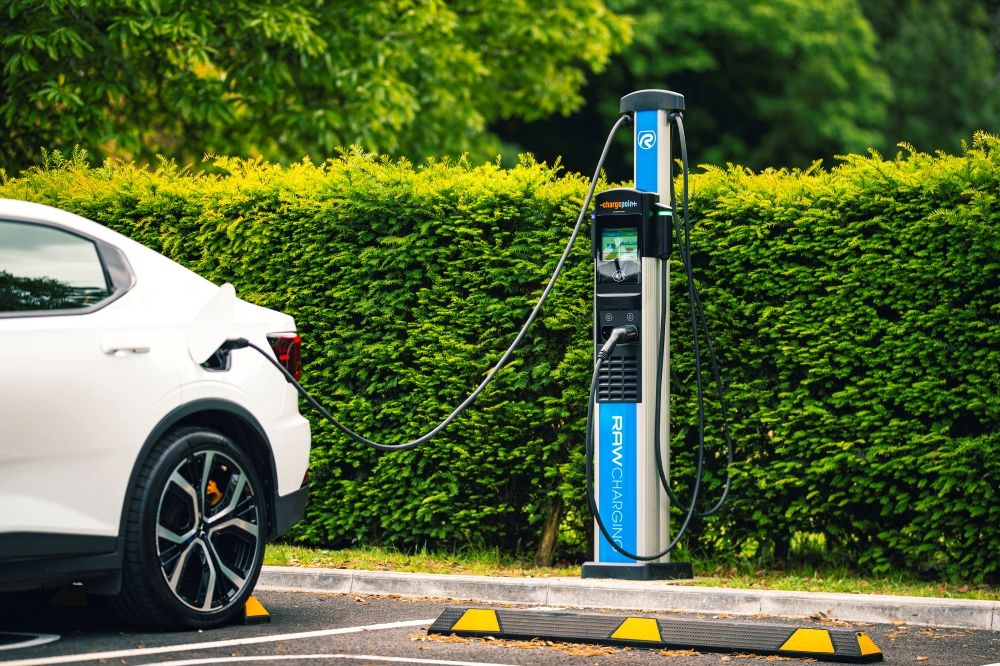The University of Exeter has opened a new Centre for Future Clean Mobility (CFCM) – with the site set to develop greener transport.
Based in the University of Exeter’s Engineering Research Centre at Exeter Science Park, the Centre for Future Clean Mobility partners with businesses to develop low-emissions, high-efficiency integrated power systems for applications in the marine, off-highway, rail, defence, and energy sectors. The Centre is committed to leading the next generation of clean mobility, which will make our streets, railways, farms, skies, seas, and waterways, cleaner and greener.
Professor Lisa Roberts, Vice-Chancellor of the University of Exeter along with The Deputy Lord Lieutenant of Devon, officially opened the University’s new Centre for Future Clean Mobility (CFCM) last week.
Guests to the official opening were invited to have a tour of the new zero emissions Dynamometer facility, the first of its kind in the UK, and the Cooperative and Autonomous Network Lab. The Dynamometer allows the team to design and test powertrain systems without the need to build an entire vehicle. Testing in the lab allows the team and industry partners to understand how much power the systems will need and how well a clean powertrain will perform in a vehicle or vessel. The Dynamometer reduces costs and risks to allow industry partners to build clean vehicles and vessels with confidence. The Cooperative Robotics and Autonomous Network Lab allows the team to design and test robotics and automated machines and systems, from flying drones to creating automated sea vessels, to achieve greater efficiencies in these green technologies.
There were also a number of zero emissions vehicles on display all of which had been designed in collaboration with the Centre for Future Clean Mobility (CFCM) including SC Group and their Supacat all-terrain mobility platform vehicle, and Quattro Group and their road sweeper and 8 tonne mobile elevated work platform (MEWP).
Supacat, in collaboration with the Centre for Future Clean Mobility (CFCM), have developed an autonomous hybrid vehicle for extreme off road military operations, designed to keep pace with battlefield logistical requirements on extreme terrain and unpredictable routes.
Professor Jim Sibson, Head of Research and Partnerships at Babcock International, who have partnered with the Centre for Future Clean Mobility (CFCM), attended the official opening.
Professor Sibson was appointed as an Associate Honorary Professor at the University of Exeter in March 2020 and is a member of the University’s Engineering department. Professor Chris Smith, Director of CFCM, spoke about how research at the centre is leading to new zero emissions products, jobs, and economic growth.
Professor Lisa Roberts, Vice-Chancellor of the University of Exeter said: “I am immensely proud to have officially opened our new Centre for Future Clean Mobility (CFCM). As a research intensive University, one of our key missions is to work with our partners to lead meaningful action against the climate emergency and ecological crisis. CFCM are going beyond borders and boundaries to create innovative solutions to make our roads, rail, sea, and air zero carbon. Partnering with businesses and organisations, their work is truly making a difference to the future of our planet and importantly, fuelling economic growth at the same time.”
Professor Sibson, Head of Research and Partnerships at Babcock International, said: “I am delighted to be involved in the official opening of the CFCM’s new facilities in Exeter. Working closely with the CFCM researchers has helped us look at the assets we supply and support for our customers and discover solutions to make the technologies cleaner. The CFCM’s progressive thinking has helped us apply their research in a practical sense and allowed us to make huge strides on our journey to a greener future. I am pleased to be partnering and collaborating with a research centre that is making a significant contribution to society.”
The CFCM facilities at Exeter Science Park have been made possible by a £2 million grant from the Heart of the South West Local Enterprise Partnership (LEP).
Claire Gibson, Head of Delivery at the Heart of the South West LEP, said: “We are delighted to have provided £2 million from the Getting Building Fund to establish the University of Exeter’s Centre for Future Clean Mobility. This is an important innovation asset that is helping to speed up the transition away from fossil fuels and position the Heart of the South West as a leader in research into the new generation of clean transportation.”
Quattro are a leading contractor providing maintenance and repair services in the Rail, Road and Construction industries. They continue to work with the Centre for Future Clean Mobility (CFCM) to create new clean powertrain for road-rail vehicles.
These new facilities are one of many new initiatives being introduced as part of the University of Exeter’s Strategy 2030, to use the power of education and research to create a sustainable, healthy, and socially just future.
Image courtesy of Shutterstock.












